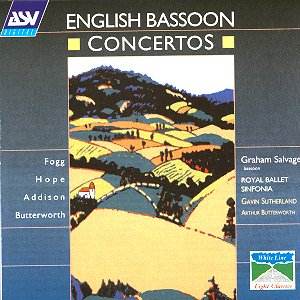Lionel Tertis, a campaigner for the viola as a solo
instrument, entitled his book on the subject, 'Cinderella No More'.
This CD then must surely illustrate the emancipation of the bassoon
in a solo role, exploiting its more lyrical aspects. While the voice
of the bassoon is characteristically full of a kind of pathos, and has
had its more comic aspect exploited to some degree, none of the composers
here represented have been tempted, Disney-like, to treat the instrument
less than seriously.
Two of the pieces on this recording - those of John
Addison and Peter Hope - are certainly light- hearted, even jazzy, with
those of Eric Fogg and Arthur Butterworth in more serious vein. What
does strike one forcibly is that despite its idiosyncratic sound, the
bassoon blends well as a solo voice and can be extremely expressive
in a romantic sense.
Here at last is an available recording of the Concerto
of Eric Fogg, a work I heard and loved so many years ago. I have been
in love with the memory and I'm delighted to say that it is for me no
less memorable in performance now, than it has been in retrospect. There
are three movements including a bright allegro vivace (whose
extremely long cadenza gives the curious impression of the soloist playing
a duet with himself). The second movement's lovely long-breathed tune
- a kind of Celtic melody - is expanded over a kind of slow march rhythm
- and the finale hints at exotic, Spanish colouring. It demonstrates
clearly its allegiances in the musical ambience in the UK between the
wars, yet has not dated, distinctive enough to sound entirely individual.
Addison's work is entitled Concertino - defining its
lighter aspects despite the somewhat portentous cadenza which opens
both first and second movements. I sense a French influence - not so
much musical as aesthetic - with the second movement developing into
a kind of alcoholic waltz à la Ibert. The melancholy song
of the third movement (the nearest approach to the comic) is followed
by a cheeky giocoso - all colours which one might expect to be found
naturally in the palette of a composer of film music, in which role
he is better known.
Peter Hope also styles his work 'Concertino' - and
after the opening 9/8 melody, unfolded over a rocking harp accompaniment,
unashamedly employs ragtime, a quasi-Blues (not however expressive of
4 o'clock in the morning but a kind of lonesome mood alleviated by some
exciting xylophone patterns,) and a final calypso/tango.
Arthur Butterworth believes that there is a melancholy
aspect in any lonely summer landscape - and his choice of the bassoon
for a work he calls 'Summer Music' rather than ‘Concerto’ is entirely
appropriate. With the solo instrument being more in a concertante role
than concerto the work, though in three movements, becomes more of an
elaborate tone poem. His view of Nature is pantheistic coming close
as it does to Bax and Sibelius. Many of his compositions seem to begin
with a kind of primeval growl, and like Bax his experience of Nature
is essentially solitary. His is a distinctive voice and it is regrettable
that, with four Symphonies (he has just completed his Fifth!) unrecorded
(when Bax, Rubbra and Vaughan Williams, and others have their symphonic
canon available in sets) the composer of music as rich in association
as this should feel so despondent as to seek solace in art! To have
reached opus 113 mostly with orchestral compositions that demand what
Bax called 'the Egyptian labour' of scoring is no small achievement.
No minimalist he!
All in all this is a welcome addition to what I imagine
must be a very small repertoire, and Graham Salvage is an ardent advocate.
Colin Scott-Sutherland
See also review
by Philip Scowcroft
See Arthur
Butterworth website


